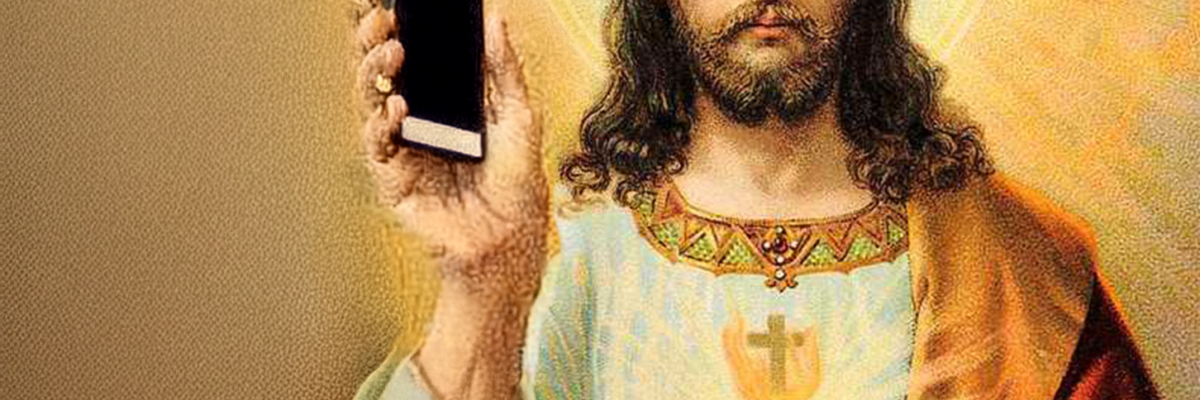
Fr. David Michael Moses discusses using social media as a tool for evangelization, noting that the disciples would likely use it to spread Jesus’ message if they were alive today.
Transcript:
Sometimes we look at all this social media stuff and we very rightly, I think, go, “This is so dangerous. Look what it’s doing to kids.” But there’s also the other side of it. There’s always the other side. Well, here’s also a tool that God put in your hands. And do you think the apostles would have done it? Do you think the apostles would have used social media or no? Would they have not?
Oh, I definitely think so. I definitely think so. I mean, I will say, you’re absolutely right. Social media is dangerous. Very, very dangerous. I would recommend for most parents just to keep their kids off of social media, honestly. The way I look at it, you know, a quick analogy is like social media is like a bad neighborhood. You know, a bad neighborhood is a dangerous place to be. I would not recommend my family, my nieces, and my nephews go live in a bad neighborhood.
But I do think that every bad neighborhood should have a Catholic church. And I think there should be a Catholic priest at that church who gets to know the area, gets to know the culture. They ought to be able to minister to the people. So I feel like even though it’s dangerous, that’s not a reason to just abandon it. I think certain people with the right disposition, the right training can go into that landscape and hopefully bring some goodness there.
So it is certainly dangerous, but I think it’s worth leaning into. And I could certainly see Jesus. I’m not sure if he would have his own account, you know, but I do think there would be people around recording what he was saying and posting it everywhere, and that would be part of the vehicle of spreading the message.
Judas would be monetizing it.
That’s a quality joke right now! Judas on the side, monetizing without telling anybody
Yeah, I got this Lord.
Too funny.
We got this, Lord. We’re going to make you famous.
So, well, yeah, I really like your dangerous neighborhood analogy. And there’s also a certain attitude sometimes in the modern world that Christians don’t belong in this space. You know, get out of our space. You know, there’s a secular bias that’s not a healthy secularism, but is a denuded secularism. Like, yeah, we don’t need you here. Do you feel that pushback sometimes?
Well, I do think that sometimes people try to avoid it, maybe avoid evangelizing there too much. You know, I just kind of think about maybe the enemy. If we were to say, “None of the Catholics are on social media anymore,” I think the devil would be like, “Really? You guys are just going to let me have it? You’re just going to give it to me and I can just run all of it.” You know, that would be his response.
I think when we say, “No, we’re going to enter in a very careful, mindful, prayerful way, look at this and see what we can do here,” that’s when the enemy is like, “Gosh, you know, I’ve got to deal with this now.” So I think it is something that’s really worth investing in the right way and can be a very, very powerful tool.
A lot of, I mean, one of, well, I should tell you this, the most common prayer request we get here at Catholic Answers is, “can we pray for something for you?” is that “my adult children will come back to the faith”. That is the most common prayer request we get.
And I saw a video that you did, by the way, we’re talking with Father David Michael Moses, if you’re just joining us. He’s a priest of the Diocese of Galveston-Houston, but he’s also very popular online and reaching lots of people with the joy of his own priesthood and with the joy of the gospel. You made a video, which was very, very negative.
It was about how the churches are empty and young people are not vitalized and all that, but the images did not match the words. So you were saying the clichés about the Catholic Church, “Nobody comes, the pews are empty.” And a lot of it was at the SEEK Conference where there were like 20,000 young people. Was it the one that was up in Salt Lake City just recently?
That’s right. Yeah, absolutely right. So young people are interested in the faith. They do want the faith. They do want the faith. So how are you reaching them? And maybe that could help all the rest of us who are thinking about how to reach young people with the gospel.
Yeah, well, I think, you know, the church has a great history, right, of going into different places, learning the language, learning the culture, and then bringing the tried and true, faithful gospel to that culture and that place in that language. And I think in modern times, that’s very much the reality now is that a lot of the young people have kind of a new culture, right, and a new language.
And that’s not a reason to be afraid or to tell them to speak a different language. I think it’s fair for us to say, “Okay, well, let’s learn the language then,” right? Like the great missionaries in the past, learn the language, learn the culture, and try to engage as much as you can.
And just for me, you know, I’ve heard a friend say recently, “People don’t let you into their homes, but they let you into their phones.” And I think that’s very, very true. If we are going after the lost sheep. And in many cases, those are young sheep, right? It’s often the lambs who kind of lose their way.
If we’re going after the lost sheep, then, you know, I’m going to perish called, it’s called Christ the Good Shepherd. And Jesus tells us the Good Shepherd goes after the sheep. And so for me, if I’m a good shepherd, I want to be a good shepherd. That means I need to go after the lost sheep, but that probably looks like learning the language.
Because people don’t, I don’t think you learn, people really don’t like the gospel. They don’t like what they think the gospel is. To kind of riff off of what Fulton Sheen talk about. People think they know the gospel, but they really don’t, right? They haven’t really encountered Jesus.
So I think if we are able to package things in the right way, then that can really make all the difference.
Tell me about that encounter with Jesus, because that’s the thing, isn’t it? The difference between the joy of the Christian life and the Christian life as obligation or as a series of “no’s” that God gives, it all comes down to that, the meeting and the knowing of the person of Jesus.
Oh, totally. I mean, that’s what it’s about. You know, and people get somewhat frustrated with the idea of religion, but really, religion is an organized way of most effectively encountering the person of Jesus Christ.
And you know, I think young people, they do think one thing that gets kind of lost today is this idea of greatness. Sometimes it’s framed as the kind of the Andrew Tate worldly, you know, having the cars and the mansions as greatness. But really, greatness is knowing the person of Jesus Christ. And that’s where the joy comes from ultimately. And that’s what we’re searching for.
So, you know, I heard a quote recently, “The magic that you’re looking for is in the things that you’re avoiding.” And I think the world so often puts out there the pleasure and the status and the comfort and all those things. And that’s not really what we’re looking for.
Like, that’s not really what we want. The magic we’re looking for—not magic in the world, it’s not magic—but magic like the meaning and the peace and the joy and the purpose. The magic is usually in the things that we’re avoiding, which is suffering, self-denial, taking up the cross.
These are the things that actually give purpose to our lives. And so I think it is about, with young people especially, saying, “No, sacrifice and suffering are not the worst evil to be avoided,” which is what the world says. It’s actually like pushing through these things. On the other side of some of that sacrifice is really going to be everything that you actually long for in life.
And what is that actually going to find there? It is the person of Jesus Christ.



